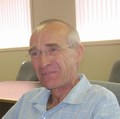2008 COMOX VALLEY SEMINAR 3 ON YOUTUBE: Nature Knows No Boundaries

“Nature has no borders; it does not recognize political or philosophical boundaries and it is essential for the health of human and non-human communities alike. To view nature in this way represents not a ‘special interest’ approach but a modern advance in civil society. We are realizing that the current loss of ecosystems and biodiversity cannot continue, yet pressures to develop land for human use is placing huge demands on what remains,” quoted Jack Minard. “Use natural systems as your infrastructure,” he added.










